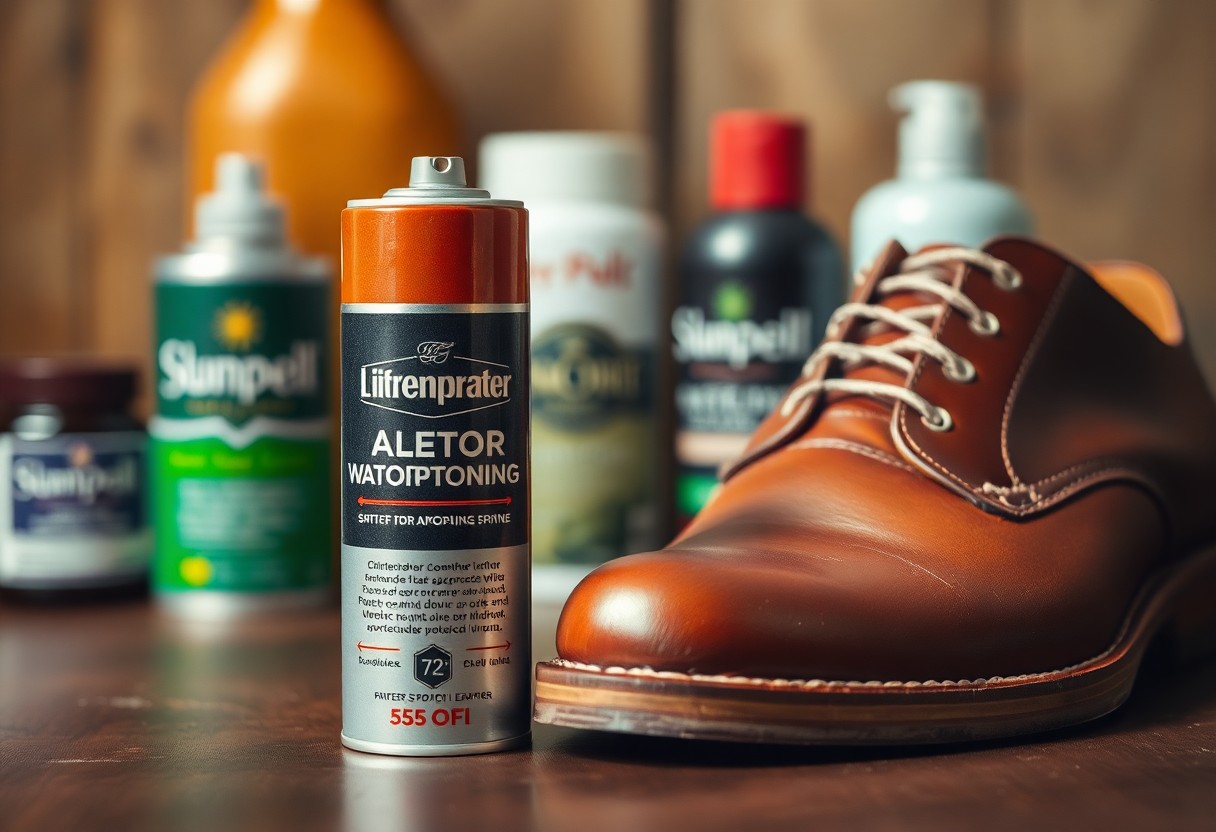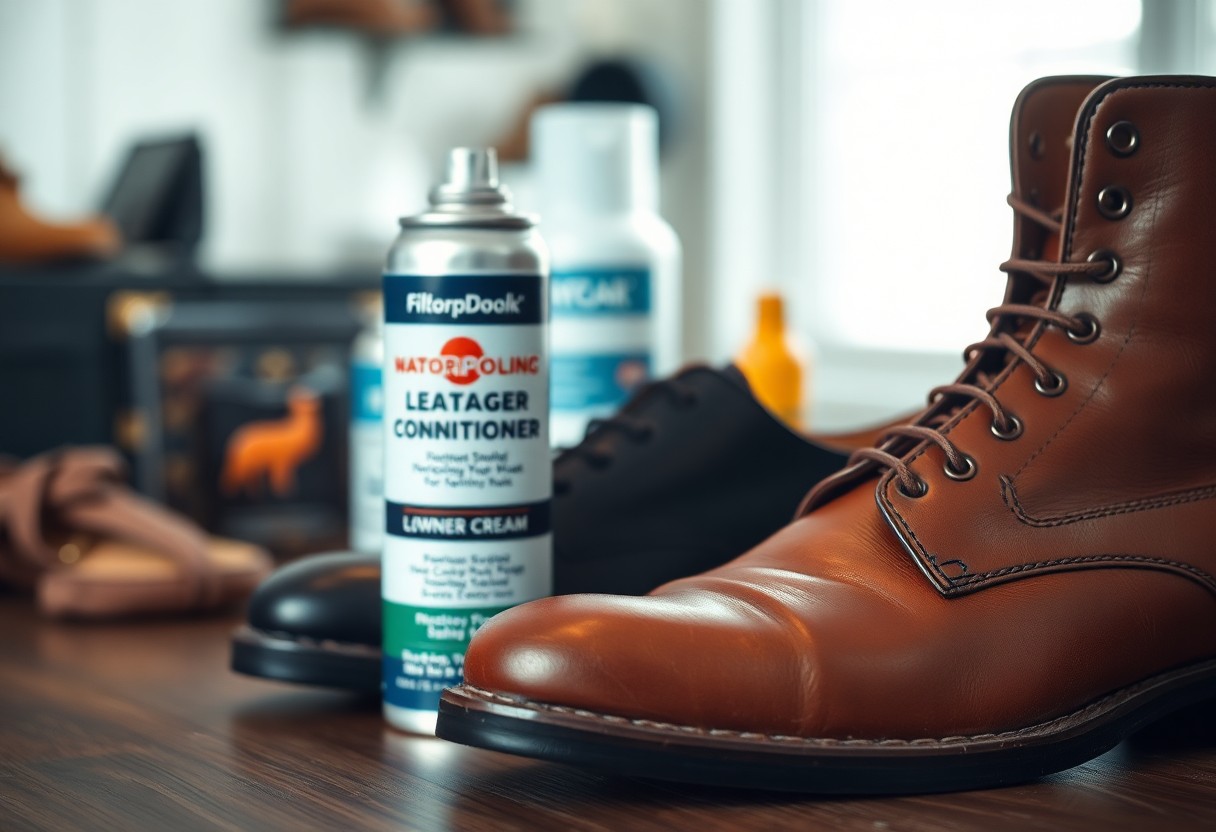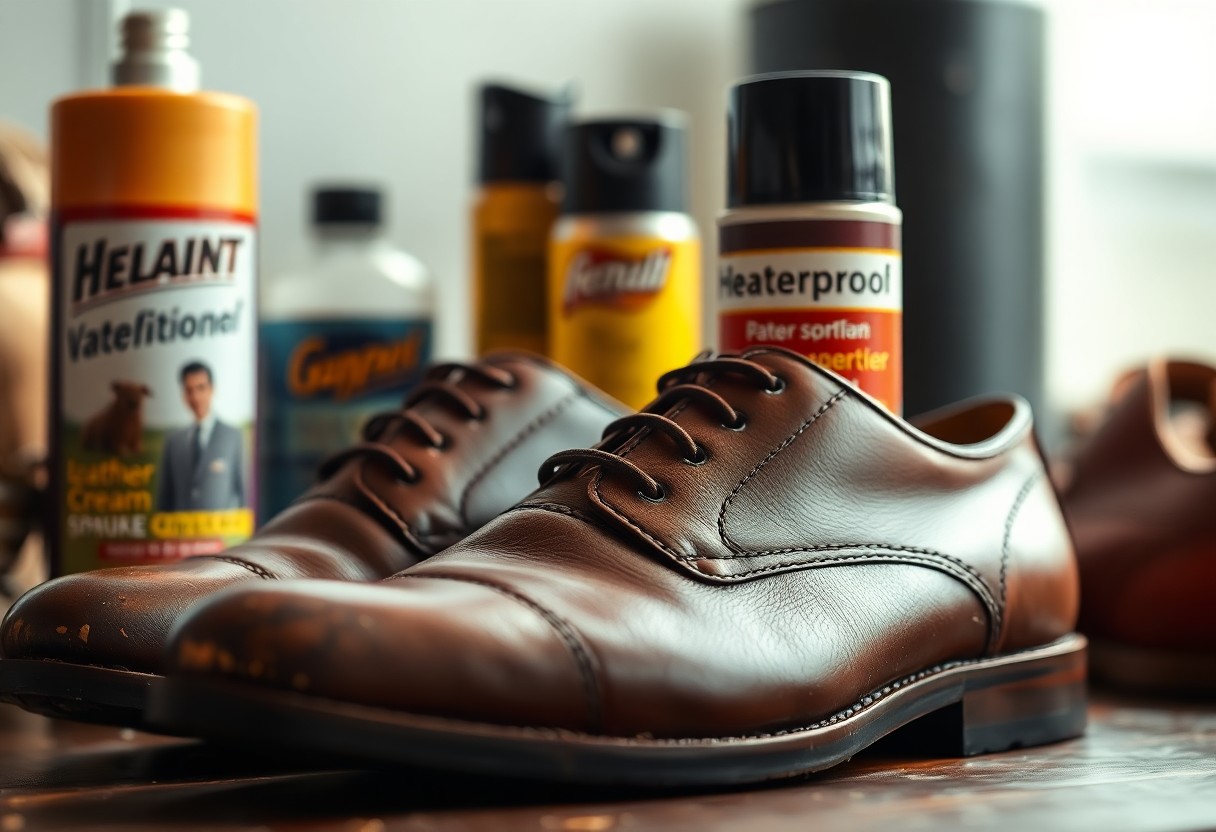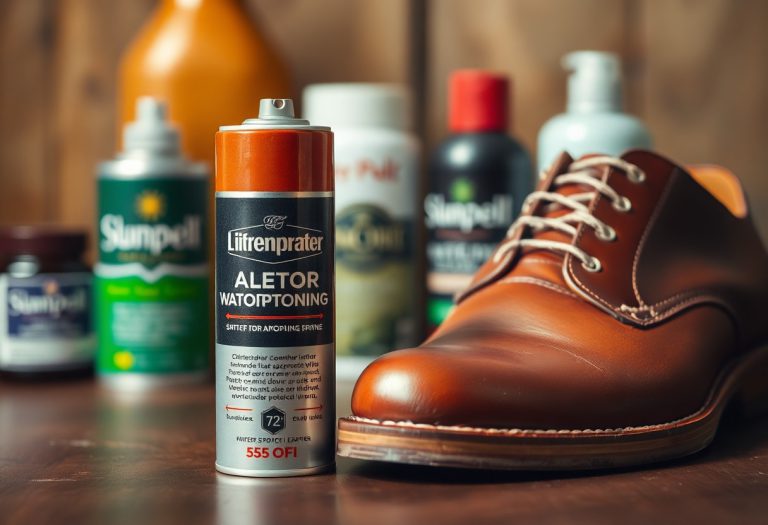Avoiding Common Leather Care Mistakes to Preserve Your Shoes is crucial, as these errors can lead to irreparable harm to your cherished footwear. One prevalent mistake involves using waterproofing sprays on smooth leather. While these sprays may appear to offer a quick and convenient solution for safeguarding your shoes, they can inadvertently prevent essential nutrients from penetrating the leather, resulting in dryness and cracking over time. Although smooth leather possesses some natural water resistance due to its grain structure, it still needs regular nourishment from shoe creams and waxes to ensure its longevity and strength. Instead of relying on sprays, opt for premium leather conditioners and wax polishes that effectively nourish and protect the leather, thereby enhancing its lifespan and maintaining its natural beauty.
Unlocking the Essentials of Leather Protection for Enhanced Longevity
To ensure the longevity of your leather items, it is vital to comprehend their protective features. Full grain leather is particularly esteemed for its natural water-resistant qualities, which stem from its tightly woven fiber structure. However, to maintain these protective characteristics, consistent care is necessary. The durability of your leather items is directly linked to the quality of care they receive. Utilizing waterproofing sprays can compromise the breathability of the leather, potentially leading to significant deterioration if not properly managed. Regular maintenance routines, including conditioning and careful cleaning, are essential for preserving both the integrity and appearance of your leather goods.
Discovering the Unique Advantages of Full Grain Leather
Post-tanning, full grain leather retains its original surface layer, providing superior natural protection. Items crafted from this material possess an intact grain layer, which offers inherent resistance to water and wear. This outer layer is infused with natural oils and fibers that form a protective barrier, making additional waterproofing sprays unnecessary and potentially detrimental to the leather’s vitality. Familiarizing yourself with these properties can empower you to make informed decisions regarding leather care, ensuring that your items not only maintain their aesthetic appeal but also endure the test of time.
Understanding Leather’s Moisture Management and Aging Dynamics
Grain leather must effectively manage its ability to absorb and release moisture. The pores in your leather enable it to breathe and regulate moisture levels, which is crucial for maintaining flexibility and preventing unsightly cracks. However, the use of waterproofing sprays can seal these pores, restricting vital airflow and disrupting the natural moisture balance that is essential for healthy leather. Additionally, as leather ages, it necessitates proper nourishment through conditioning products. The application of waterproofing sprays can create a barrier that hinders essential conditioning oils from penetrating the leather, resulting in dryness and brittleness over time. By regularly applying leather cream, your leather can age gracefully while developing a rich, attractive patina.

Avoiding the Pitfalls of Waterproofing Sprays
Misinformation surrounding waterproofing spray as the ultimate remedy for protecting leather shoes is widespread, and this misconception can lead to considerable damage to your footwear. While these sprays do provide an initial shield against water ingress, they simultaneously obstruct essential nutrients from reaching the leather, paving the way for potential long-term degradation. It is vital to understand the genuine implications of these products for effective leather care and to maintain the quality of your shoes.
Debunking Common Myths in Leather Care Marketing
Due to aggressive marketing tactics and well-meaning yet uninformed advice from retail associates, many individuals have been led to believe that waterproofing spray is essential for all types of leather shoes. This misconception is perpetuated by various shoe retailers, who profit from the high margins and repeat purchases associated with these products. In reality, regular smooth leather possesses inherent protective characteristics that do not require additional spray-on barriers for effective safeguarding. By educating yourself on appropriate leather care techniques, you can steer clear of unnecessary purchases and extend the life of your footwear.
Evaluating Short-term Benefits Against Long-term Leather Health
The deterioration of your leather shoes begins when waterproofing sprays establish a barrier that prevents essential oils and conditioning agents from being absorbed by the leather. While you may initially notice enhanced water resistance, the reality is that your leather gradually becomes dry and fragile without the crucial nourishment it needs. The consequences of using waterproofing sprays on smooth leather extend beyond surface-level protection. Your leather demands ongoing nourishment to sustain its flexibility and durability. When shoe creams and conditioners cannot penetrate the leather due to the spray barrier, the material risks cracking and deterioration, significantly reducing the lifespan of your shoes. Natural waxes and proper conditioning approaches offer superior long-term protection while nurturing the health of the leather.

Diving into the Science of Effective Leather Care
A fundamental aspect of successful leather care lies in understanding its molecular structure. The collagen fiber networks in your leather shoes require both protection and nourishment. When products are applied to leather, they can interact with the fibers either by coating them or penetrating deeper into their structure. This interaction is crucial for the lasting health of your leather footwear. Gaining a deeper understanding of this process can empower you to make more informed decisions concerning which products to use for optimal leather care.
Recognizing the Importance of Regularly Nourishing Leather
It is essential to acknowledge that your leather shoes require consistent nourishment to retain their quality. The natural oils found in your leather help prevent cracking and maintain flexibility. Over time, these oils diminish due to regular wear and exposure to various environmental conditions. To preserve the structural integrity of the leather, replenishing these oils through regular conditioning with appropriate products is vital.
Understanding the Barrier Effects of Waterproofing Sprays
A significant drawback of waterproofing sprays is their tendency to create a barrier. When these sprays are used on smooth leather, they form an impenetrable layer that obstructs both water and crucial nutrients. This barrier prevents your leather care products from effectively penetrating the surface, leading to a gradual decline in the quality of the leather over time. Recognizing this effect can help you avoid products that may ultimately harm your leather in the long run.
The barrier created by waterproofing sprays initiates a harmful cycle for your shoes. While these sprays successfully block water, they simultaneously hinder the absorption of conditioning products that are vital for maintaining leather health. Consequently, while the leather may appear shielded on the surface, it is actually dehydrating and becoming brittle underneath. Silicone-based sprays are particularly detrimental, as they create a permanent barrier that is challenging to remove without inflicting damage on the leather.
Applying Proven Techniques for Leather Protection
Contrary to popular belief, smooth leather shoes necessitate specific care methods that align with the natural properties of full-grain leather. The most effective strategy combines traditional care techniques with products designed to enhance the leather’s inherent protective features, ensuring both immediate safeguarding and lasting durability for your footwear.
Utilizing the Benefits of Wax-based Solutions
A highly effective alternative to waterproofing sprays is premium wax-based products. These solutions work synergistically with your leather’s natural grain rather than against it. When applied, wax polish forms a protective layer that still allows the leather to breathe, making it especially advantageous for toe caps and areas subjected to high wear on your footwear.
Maximizing the Benefits of Cream and Conditioner Applications
In contrast to conventional spray treatments, leather creams and conditioners provide essential nourishment while preserving the leather’s natural protective attributes. Your shoes benefit from oils that deeply penetrate the material, aiding in the prevention of drying and cracking. Furthermore, regular application of cream and conditioner yields a cumulative effect that enhances leather quality over time. The natural oils present in these products support the leather’s flexibility and strength, enabling it to develop a stunning patina. It is advisable to apply these treatments every 4-6 wears to maintain optimal leather condition.

Identifying When Waterproofing Sprays Are Appropriate
While waterproofing sprays may not be suitable for smooth leather, they can be beneficial for certain materials that require additional water resistance. These products create an effective barrier against moisture on specific materials that lack natural protection. Waterproofing sprays are particularly beneficial for suede, nubuck, and various textiles, where the material’s composition does not offer built-in moisture resistance.
Boosting Suede and Nubuck Resistance with Waterproofing Spray
When waterproofing spray is applied to your suede or nubuck shoes, you significantly improve their resilience against moisture damage. Although many modern suede materials are pre-treated with factory waterproofing, applying additional protection can help sustain this defense over time. The spray creates a barrier that effectively prevents water from soaking into these delicate materials, preserving their appearance and structural integrity.
Ensuring Effective Protection for Textile Footwear
In addition to leather alternatives, textile shoes need tailored protection against water damage. Materials such as canvas, mesh, and synthetic fabrics can achieve improved water resistance through the appropriate application of spray products. Most textile materials are naturally absorbent, rendering them vulnerable to staining and water damage. By utilizing waterproofing sprays for textiles, you help maintain the shape and color of your shoes. The protective barrier formed also prevents dirt and debris from embedding in the fabric fibers. It is recommended to reapply the spray every 3-4 months for optimal protection, based on how often the shoes are worn and the prevailing weather conditions.
Expert Recommendations for Optimal Leather Care Practices
Not all leather treatments are equal. Experts in the industry strongly caution against the use of waterproofing sprays on smooth leather. Full-grain leather shoes require specialized care that allows them to breathe and absorb nourishing treatments effectively. Using inappropriate products can lead to leather damage that may cost hundreds of dollars in repairs or replacements.
Insights from Tannery Specialists on Leather Preservation
To maintain leather quality, tannery specialists emphasize that full-grain leather possesses inherent natural water-resistant properties in its outer layer. To preserve these protective qualities, oils and waxes must be applied regularly. Waterproofing sprays can obstruct these necessary treatments from reaching the leather, jeopardizing its integrity and longevity over time.
Guidance from Professional Cobblers on Maintaining Leather
For long-lasting leather care, professional cobblers recommend opting for wax-based products in lieu of waterproofing sprays. Your shoes will benefit from treatments that both protect and nourish the leather. Research shows that 90% of premature leather damage is attributed to the use of incorrect care products. By following proper leather care practices, your shoes can last an impressive 15-20 years instead of merely 2-3 years with insufficient maintenance. Traditional wax treatments enable leather to retain its natural characteristics while offering adequate moisture protection. Your investment in quality leather footwear deserves diligent care practices that enhance both its aesthetic charm and durability.
Key Insights for Successful Leather Care
Your smooth leather shoes require careful maintenance that avoids waterproofing sprays. Instead, choose shoe creams and waxes that nourish the leather while providing effective water protection. Full-grain leather already possesses protective features due to its grain layer, and waterproofing sprays may impede essential oils from penetrating the leather, causing dryness and cracking. Reserve waterproofing sprays for suede, nubuck, or textile footwear where they can be beneficial. By selecting the right products, you can effectively protect your leather shoes while ensuring their longevity.
Your Leather Care Queries Addressed
Q: Why is waterproofing spray detrimental to smooth leather shoes?
A: Waterproofing spray creates a barrier on leather that obstructs essential oils and conditioners from entering the material. While it offers water protection, it disrupts the necessary nourishment to the leather, resulting in dryness and possible cracking over time, ultimately shortening the lifespan of the shoes.
Q: What alternatives should I use instead of waterproofing spray on smooth leather shoes?
A: It is recommended to use a combination of shoe cream and wax polish instead. Shoe cream infuses essential oils to nourish the leather, while wax polish forms a protective layer that aids in repelling water. This method complements the natural protective characteristics of full-grain leather, preserving the leather’s health while ensuring effective water resistance.
Q: Which types of shoes can I safely apply waterproofing spray to?
A: Waterproofing spray is appropriate for materials like suede, nubuck, and textiles. These materials lack the natural protection found in smooth leather and thus benefit from the moisture-resistant barrier created by waterproofing sprays. Many modern suedes and nubucks may already have factory waterproofing treatments, but additional spray applications can enhance and maintain this level of protection.
The Article Why you shouldn’t use waterproofing spray on regular smooth leather and better alternatives appeared first on My Shoes Finder
The Article Waterproofing Spray on Smooth Leather: Risks and Alternatives Was Found On https://limitsofstrategy.com
References:
Waterproofing Spray on Smooth Leather: Risks and Alternatives





Ah, the conundrum of leather care – it’s like trying to decipher the rules of a very exclusive club, isn’t it? One moment you’re feeling like a footwear aficionado, and the next, you’re cringing as you realize you’ve been treating your beloved shoes like a sponge instead of the sophisticated material they are.
I totally get what you mean about leather care feeling like an insider’s game. It’s like you think you’re doing everything right, then suddenly you hear about a product or method that completely flips your understanding. I remember getting my first pair of quality leather shoes and feeling a wave of anxiety about keeping them in pristine condition. It turns out that treating leather like it’s just a tougher fabric can lead to some pretty unfortunate results.
Navigating the world of leather can feel a bit like cracking a secret code, but diving into the unique traits and uses of this chic material helps us keep our shoes and bags looking their best without the guesswork.
‘Leather Characteristics: Key Insights and Essential Uses’
https://cleanyourhome.com.au/leather-characteristics-key-insights-and-essential-uses/.
I hear you on that feeling of anxiety when it comes to leather care. It really can seem like an exclusive club sometimes, and if you’re not in the know, you can end up making choices that just don’t sit right with the material. I remember my first encounter with quality leather as well—it was a whole new ballgame, and the last thing I wanted was to ruin something special just because I didn’t know how to take care of it properly.
You’re spot on with that imagery of leather care feeling like an exclusive club. It’s puzzling how something like maintaining a pair of shoes involves so many nuances. One minute, you’re carefully polishing your leather boots, feeling all grown-up and sophisticated, and the next, it hits you that you might as well have been throwing them in a washing machine for all the good you did.